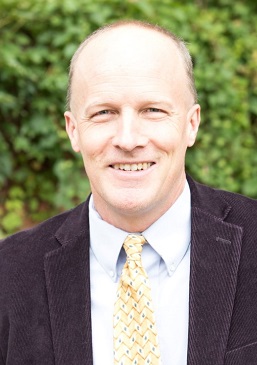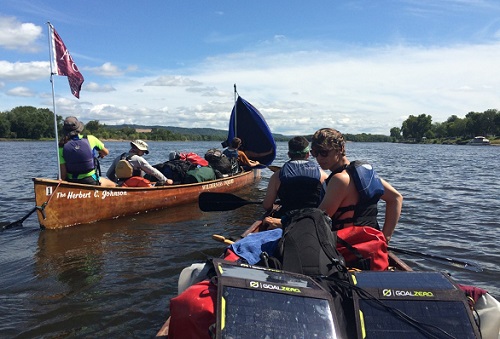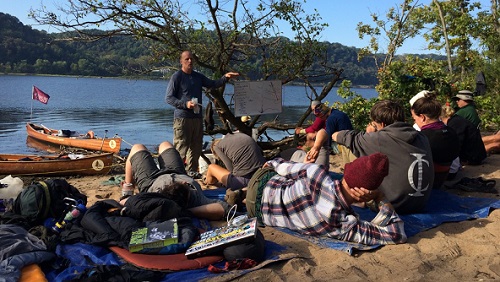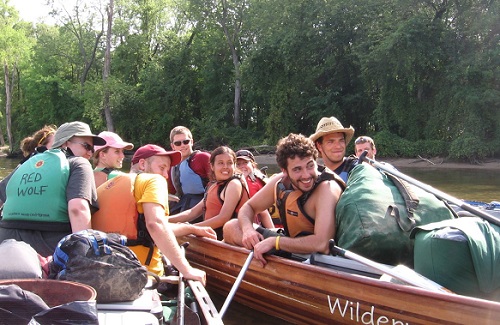The Mill City Times Interview: Professor Joseph Underhill, Augsburg University
 Tuesday, December 1, 2020 at 8:00AM |
Tuesday, December 1, 2020 at 8:00AM |  Becky Fillinger |
Becky Fillinger | Article by Becky Fillinger
 Professor Joseph UnderhillProfessor Joseph Underhill heads up the River Semester at Augsburg University, a truly unique educational experience. He has taken students out on the Mississippi River for the past fifteen years studying the impact of human activity on the river ecosystem and meeting with guest lecturers and local activists in communities all along the expanse of the river. We talked to him about the program and how all of us can stay more connected to our precious river resources.
Professor Joseph UnderhillProfessor Joseph Underhill heads up the River Semester at Augsburg University, a truly unique educational experience. He has taken students out on the Mississippi River for the past fifteen years studying the impact of human activity on the river ecosystem and meeting with guest lecturers and local activists in communities all along the expanse of the river. We talked to him about the program and how all of us can stay more connected to our precious river resources.
Q: Please tell us about River Semester at Augsburg University. Did you design the program?
A: The River Semester is a unique research and educational expedition that travels, primarily by canoe, down the length of the Mississippi River. When I moved to the Twin Cities in 1998 to teach at Augsburg, I began looking for ways to get students out on the river. This started in 2000 with a 5-day trip that was part of an expedition organized by the Audubon Society. Twenty years later, the program now spends 100 days traveling from the Headwaters at Lake Itasca down to St. Louis, Memphis, New Orleans, and ending at the Gulf of Mexico. We take around 20 people in four large Voyageur canoes, camping, cooking meals, conducting field research, holding classes, visiting sites, and hearing from guest speakers.
The program runs in the Fall term from approximately August 30th to December 10th. Students in the program take a full semester of courses in a range of disciplines, primarily in Environmental Studies and interdisciplinary Social Science. The River Semester is a regular part of the programming offered by Augsburg University’s Center for Global Education and Experience (CGEE).
Over the course of the fall term, participants paddle for around half the time, camping on islands or campsites on shore, and covering three main sections of the river - the Headwaters (Lake Itasca to Bemidji), the Upper Mississippi (Twin Cities to the Driftless region), and the Lower Mississippi (from Vicksburg to the Gulf of Mexico, including a stretch of the Atchafalaya River). The remaining time is spent in field research at locations along the river, with transit in vans between different river stretches and field stations. There are more extended layovers in the St. Louis area, and in New Orleans and the Gulf Coast.
In addition to their learning of course content, students gain leadership skills and a greater sense of self-confidence, resilience, and vocational discernment. By stripping away the protections and forms of insulation found in “normal life," the students are made directly and intimately aware of the variability of the weather, with increased appreciation for what climate change can really feel like. The upside of these challenges is that they provide frequent opportunities for participants to experience the hospitality of residents and “River Angels” along the way. Over the years we have been hosted by numerous churches, homes, and organizations. This experience - so different from dominant discourses around animosity, danger, and polarization these days - provides some basis of optimism about human kindness. The program sees this as one of its main values, and many students noted how pleasantly surprised they were to receive such generous hospitality.
Q: Will the program be offered in 2021?
A: Yes, the next expedition will be in the Fall Semester of 2021, with the next group of students heading up to Lake Itasca on September 1st. We have future trips planned on an annual or biannual basis, depending on the level of interest and student demand. We are currently recruiting the next crew, with students coming from all over the country. Any undergraduate students interested in applying should go to www.augsburg.edu/river to start their application, and they can contact me (underhil@augsburg.edu) to discuss options and find out more about the program.
We've had some international guests as well, from Germany, Israel, Jordan, Portugal and Norway, and see more potential for involving international students and researchers on future trips, since interest in the Mississippi River extends well beyond our borders.



Q: You're a proponent of experiential and interdisciplinary learning. River Semester is a first-class example. Do you consult with other universities or corporate entities (or other organizations) on the benefits of this type of learning?
A: We work with a number of amazing partners in bringing this opportunity to our students, and lots of folks are seeing the value in this kind of applied, hands-on learning combined with a rigorous academic course of study. We work with Wilderness Inquiry - a national leader in outdoor learning - as our outfitter, and are connected to several networks in higher education that do work on rivers and with these kinds of experiential, immersive programs. These include the Associated Colleges of the Midwest (ACM), and a newly formed group of river studies schools and programs, organized in collaboration with the River Management Society. We see this kind of teaching and learning as crucial to preparing students to navigate the challenges of the 21st Century, and to acquire the kind of synthetic knowledge and integrative skills needed to tackle the complex environmental and political problems we are currently facing.
We've also received support from companies like Pentair, to support the participation of students of color in STEM education, which reflects the value they see in this kind of education. I do get questions from other faculty about setting up these kinds of programs. I haven’t done any paid consulting on this, but there is a fair amount of interest out there in developing similar programs for undergraduates.
Q: One core area of your expertise is environmental politics. What can a person do locally - politically - to address environmental issues?
A: Well, in the Twin Cities we are blessed with a rich array of organizations - like the Mississippi Park Connection and the Friends of the Mississippi River - that do great work on behalf of the river and communities living along it. I definitely recommend that folks join and support these organizations and contact your local legislator to find out what river-related legislation is in the works. We've had great strides in improving water quality in the Mississippi, but we still have a long way to go. And there are ongoing issues of environmental injustice with BIPOC communities still bearing the brunt of the effects of pollution and forced removal from traditional homeland along the river. I'd say pick a project, a specific topic and roll up your sleeves and get to work. There's no great mystery to it - it's just a matter of prioritizing the stewardship of the world around us, which most definitely includes the Mississippi River. Change comes slowly, but it does come.
Q: Since most of us cannot enroll in River Semester, how might we immerse ourselves in learning more about the Mississippi River?
My recommendation is first to spend as much time along or on the river as you can, whether that is walking, biking, boating, or just sitting on a bench by the shore. There is always something to learn, something new to observe, and there is always some peace and solace to be found there as well. If you're so inclined, and have the resources, there are plenty of river tour companies, including some of the big paddle boats that offer cruises. The Paddle Share program in the Twin Cities is another really innovative way for folks to get out on the water. And there is endless reading one can do, including travelogues, histories, and fiction. A few good sources to start with include Calvin Fremling's Immortal River, Gwen Westerman and Bruce White, Mni Sota Makoce, Eddy Harris' Mississippi Solo, John Anfinson's The River we have Wrought, and John Mcphee's "Atchafalaya" in his book The Control of Nature.
Q: Your program is so impressive! How can we follow news about you and the River Semester programs?
A: During our expeditions we post on Facebook, Instagram, and the River Semester YouTube channel fairly regularly, with updates on our latest encounters and adventures along the way. You can check out those pages for examples of what we've done in the past, including some nice videos made by past students on the trip.
